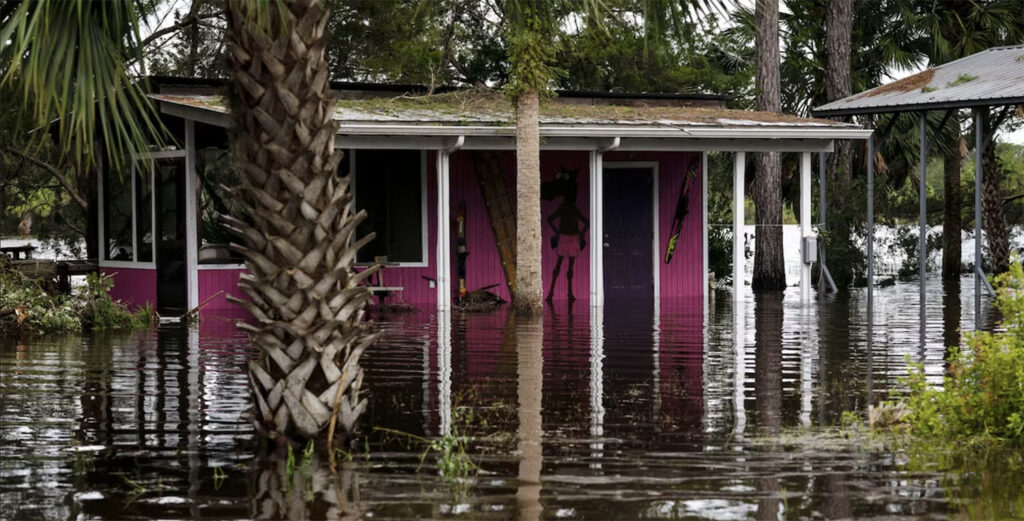By Alliance for Sustainability President Terry Gips
The Alliance has warned of this day for decades: Most people living in the most climate-impacted parts of the US will no longer be able to either get or afford home insurance covering natural disasters. Major insurers are either cutting coverage or dramatically increasing rates, points out this disturbing Washington Post article. What next? States will need to step in. But how long will they be able to afford it with $3.2 billion per disaster costs like on Maui?
Who will then foot the bill? The US government and all of us as taxpayers. How long will it take before taxpayers say no to rebuilding in continual flood, fire and hurricane-prone areas? For those feigning concern about the federal deficit but continuing to deny climate change and its impacts, it’s time to connect the dots, count the numbers, listen to science, support a transition to clean energy and stop rebuilding in disaster-prone areas.
Record-setting claims and losses
The Post points out that US insurers have disbursed $295.8 billion in natural disaster claims over the past three years, according to international risk management firm Aon. “That’s a record for a three-year period,” reports the American Property Casualty Insurance Association.
Aon found that US natural catastrophes during the first six months of 2023 caused $40 billion in insured losses, the third costliest first-half on record.
Major US property insurers give notice
“At least five large US property insurers — including Allstate, American Family, Nationwide, Erie Insurance Group and Berkshire Hathaway — have told regulators that extreme weather patterns caused by climate change have led them to stop writing coverages in some regions, exclude protections from various weather events and raise monthly premiums and deductibles,” according to the Post.
“Major insurers say they will cut out damage caused by hurricanes, wind and hail from policies underwriting property along coastlines and in wildfire country,” WaPo adds, reporting on a voluntary survey conducted by the National Association of Insurance Commissioners, a group of state officials who regulate rates and policy forms.
“There’s no place to hide from these severe natural disasters,” said David Sampson, president of the American Property Casualty Insurance Association. “They’re happening all over the country and so insurers are having to relook at their risk concentration.”
“The same risks that are making insurance more important are making it harder to get,” Carolyn Kousky, associate vice president at the Environmental Defense Fund and nonresident scholar at the Insurance Information Institute, told The Washington Post.
Regulations force insurers to raise rates for everyone
And what makes it even more difficult for consumers is that rate increases for homeowners insurance are regulated by state agencies. That can prevent firms from pricing policies that accurately reflect risk, according to Daniel Schwarcz, who studies insurance markets at the U of MN Law School. According to the Post, he says that instead of setting much higher prices for policies in specific areas that might be more vulnerable — such as regions below sea level or on the edge of fire-prone areas — insurance firms must set prices that are relatively comparable across an entire state.
He then adds this disturbing note, “The fact that insurers have the capacity to limit their exposure or change their exposure over time means at the end of the day their concerns are not fully aligned with the concerns of their policyholders.” It used to be that insurers and their policy holders had a shared goal of reducing rates and risks. However, Schwarcz is pointing out that the shared goals of companies and policy holders no longer exist when it comes to climate disasters.
Taxpayers will foot the bill
Evidently, more and more of us will be hit by climate change and massive losses, but have to pay for it as well. Pay attention climate deniers. The wake up alarm is going off. We need to stop living in some fantasyland that our government will somehow pay for it.
For those who choose to deny climate change, this underscores the fact that they will definitely suffer from it and ultimately their taxes will go up. But even then, it will be future generations and low- and middle-income people who pay the real, catastrophic costs. This is a social justice issue.
When will we finally take climate action? The number and intensity of storms, heat events, droughts, floods and ocean levels are all going up. It’s time we wake up and invest in a clean energy future. In addition, it’s hard to face this disturbing reality, but we will ultimately need to stop rebuilding in disaster-prone areas. This will be one of the most controversial and divisive issues in the future.

